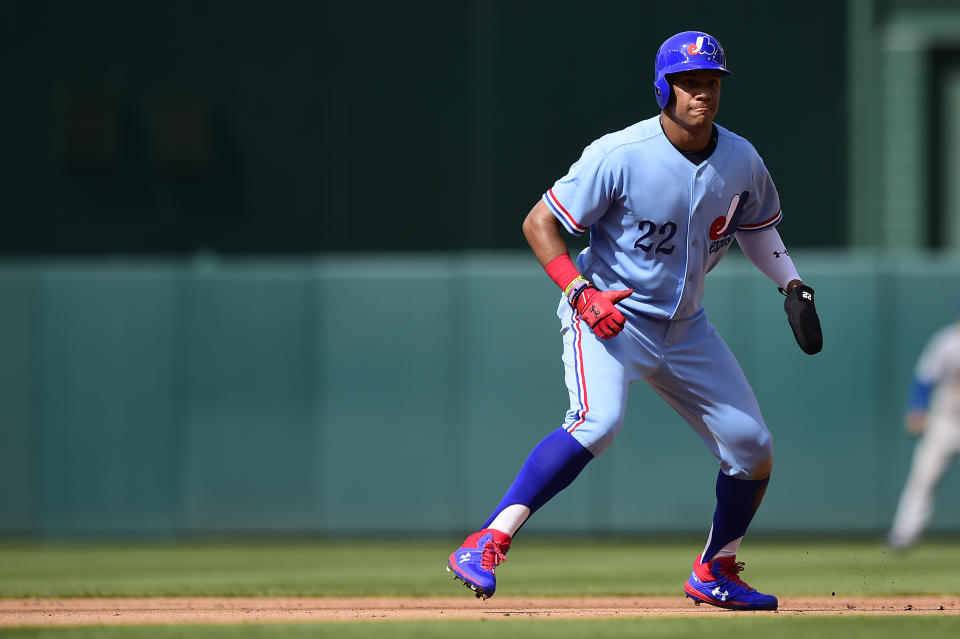Five things you need to know about MLB's plan for a season unlike anything we've ever seen
Finally, after weeks upon weeks of stalled negotiations, Major League Baseball is on its way back. The 2020 season won’t look like anything we’ve ever seen before — and with good reason — but baseball is indeed preparing to start a 60-game season, reportedly with opening day coming on July 23 or July 24.
Baseball’s return brings with it sweeping rule changes, uncertainty in terms of the coronavirus and even some hard feelings after a head-butting negotiation process.
Here’s what you need to know about what the 2020 season will look like and what changes baseball traditionalists need to start preparing themselves for now.
1. The universal DH is here — for now
Pitchers hitting isn’t dead in MLB, not all the way. The long-talked-about universal DH is coming to baseball this season, but maybe only for this season. The universal DH was discussed at various points in negotiations, but for now, it will only be a 2020 rule change. There was a provision in the last offer from MLB, which players rejected, that would have carried the universal DH into 2021.
Still, 2020 should be a good test case for the DH in the National League. Baseball tinkers with rules every year, so if both sides want to keep it, there’s room for a change in 2021 too.

2. Extra innings will look different
In order to prevent games from going 15 innings in an already rushed season, Major League Baseball will reportedly be implementing a new extra-innings structure that people who watch Minor League Baseball are familiar with.
Teams will start extra innings with runners on second base, a practice that will rattle traditionalists but should help prevent games from dragging into 14-, 15- or 16-inning marathons. It’s earned some positive feedback in the minors, but the minor leagues are already kind of zany. The larger MLB fanbase will take some convincing. This would not apply to playoff games.
3. Who won the battle over money
Nobody scored a KO in the biggest fight of the baseball shutdown. Rather than concede, the players union rejected the last offer from the owners, knowing that would cause commissioner Rob Manfred to impose a season of his liking under the terms of the two sides’ March agreement, which gives the players prorated salaries based on the number of games played.
The players can hold their heads high for not caving and possibly file a grievance against MLB (that some believe could pay as much as $900 million if the players win). They didn’t budge off their No. 1 demand, which was not taking a second pay cut from owners.
The owners, meanwhile, got to keep salaries at a point they’re comfortable with by mandating a shorter season than the players wanted. The last players union proposal was for 70 games, which could have paid them about $250 million more total.
4. No bubble season, for now
As of right now, there are no plans for Major League Baseball to attempt a bubble season like the NBA is doing. The idea has been floated again, given the recent uptick in coronavirus positive tests in MLB, but right now, teams will be using their (empty) home stadiums as home bases.
As Yahoo Sports’ Hannah Keyser reports, that could still change. Contingency plans are being discussed in case surges in COVID-19 cases force some teams to leave their home parks. The league and players agreed on health and safety protocols Tuesday, but some questions remain unanswered. At least publicly. How will players be tested after being around friends or family? What about non-player personnel like trainers and staff? How will teams travel and limit exposure?
5. A new era of labor unrest
The biggest long-term issue now facing players and team owners is officially entering an era of labor unrest. While the two sides had been unhappy with each other in recent years, this disastrous attempt at finding middle ground to restart the season exposed just how much they don’t see eye-to-eye.
No doubt, hard feelings will be lingering in years ahead. And we might see the ramifications rather quickly. The current collective bargaining agreement expires after 2021. Experts had already expected a work stoppage once the CBA expired, but carrying all the resentment into the next round of negotiations could lead to an ever worse situation for MLB.
More from Yahoo Sports:

